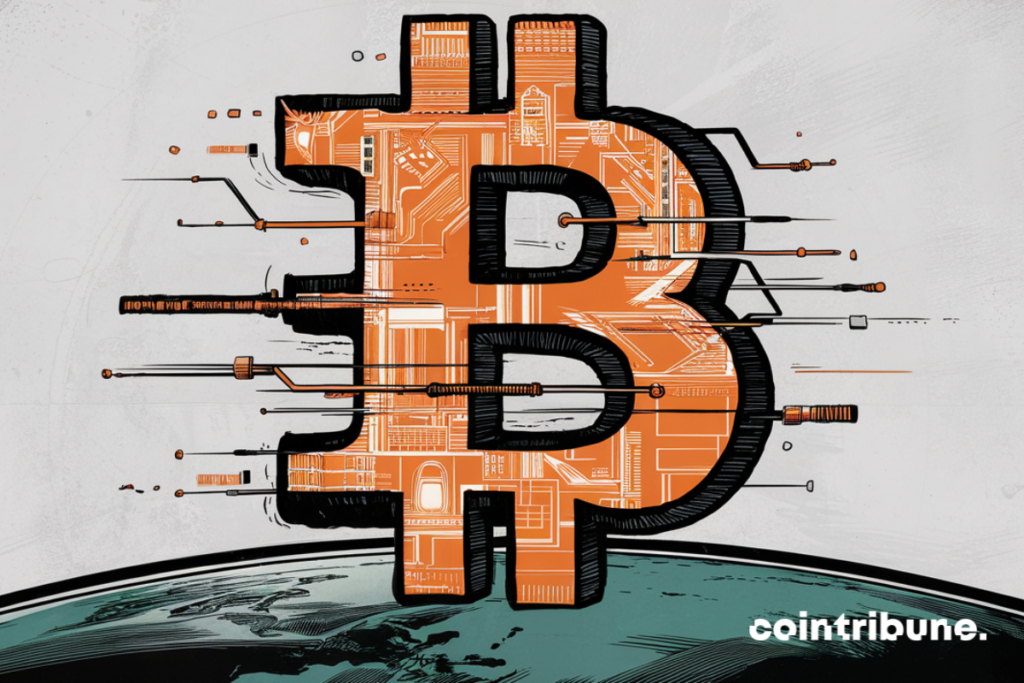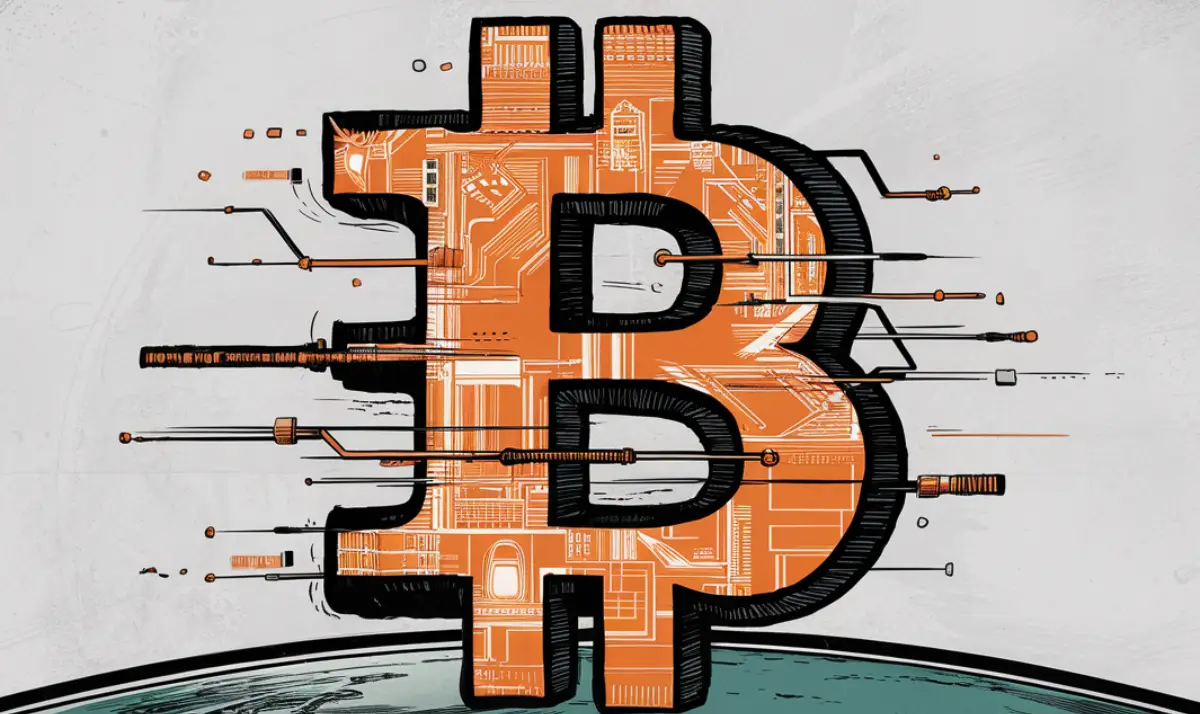Tue June 11, 2024 ▪
8
min reading ▪ acc
Vladimir Putin recently stated this “The Bretton Woods system is dead”. The world needs an alternative and Bitcoin seems to be the obvious one.

Imperial currency
Monetary hegemony rarely lasts more than 100 years. The Florentine florin, which ruled the roost in the fourteenth century, would eventually dethrone the Portuguese real. Then came the Spanish real, the Dutch guilder, the French pound, the pound sterling, and then the dollar.
Here’s a fantastic infographic tracking the evolution of the share of various currencies in international foreign exchange reserves since 1900:
It was from the 1950s that the dollar definitively displaced the pound sterling. The transfer of power took place during the Bretton Woods Conference. 40 allied countries agreed that the dollar would become the cornerstone of the international monetary system.
The United States was actually in a position of strength due to the fact that most of the world’s gold reserves were located at Fort Knox (almost 70%). The American war effort was not entirely without reason… In this context, let us recall the famous statement of President Truman two days after Hitler’s invasion of the Soviet Union:
“If we see Germany winning, we must help Russia, and if Russia is winning, we must help Germany, and thus let them kill each other as much as possible, although I do not want to see Hitler as the winner by any means. »
In short… The dollar, the only currency freely convertible to gold, became the international reserve currency. It was decided that an ounce of gold would be worth $35 and that all exchange rates would be fixed.
This convertibility for gold was a way for the old continent to ensure that the United States would not finance its imports by printing money. Until…
1971
The Bretton Woods system collapsed in 1971 when President Richard Nixon suspended the conversion of the dollar into gold. Since then, exchange rates have been “moving”.
US Treasury Secretary John Connally told an angry European delegation: “The dollar is our currency, but it’s your problem.”
This decision was made for two main reasons. The first is that European and Japanese exports became more competitive in the 1960s. The result was a decline in the United States’ share of world production, which reduced the need for dollars. European countries therefore decided to drain the US gold reserves, which would drop from 20,000 to 8,000 tons.
Second, Washington knew that the nation’s oil peak reached in 1971 would greatly worsen its trade deficit. The price of a gallon of gasoline increased by 20% between 1964 and 1970.
That’s when Secretary of State Henry Kissinger orchestrated America’s greatest geopolitical coup: the petrodollar. Go to this article for a retelling of this fascinating story.
The short story is that Saudi Arabia and other OPEC member countries were forced to sell their oil exclusively in dollars. So much so that despite the end of the gold standard, all industrialized countries had no choice but to hold their foreign exchange reserves in dollars.
Fifty years later, the US currency is once again at the center of geopolitical tension. The Russian president reiterated this last week.
Petrodollar, no!
At the International Economic Forum in St. Petersburg, Vladimir Putin reiterated that the world needs a new international monetary system:
“The Bretton Woods system, based on the gold standard, is long dead. (…) The United States abandoned it because of the system established by the Jamaica Accords, which separated the dollar from gold”he said.
“What is actually the basis of this Jamaican system that persists to this day? Confidence in the US economy. In today’s global financial system, there is no other guarantee, so to speak, than confidence in the American economy..
The problem is that Americans benefit enormously from the end of the gold standard. For the Tsar of Russia, “Public figures show the United States owes the rest of the world about $54 trillion”. This figure probably represents the cumulative foreign deficit of the United States.
The existence of this massive foreign deficit is due to central banks holding several trillion dollars in reserve in the form of Treasury bills (public debt). These are all dollars that are not converted to other currencies and artificially prop up the value of the dollar. And this despite the chronically deficit trade balance. Only the United States has such a privilege.
The United States not only benefits from the system, but abuses it (disconnecting entire countries from the SWIFT network, freezing foreign exchange reserves, etc.). Between the militarization of the dollar and the insolvency (“freeze”), it is no surprise that the BRICS consider de-dollarization a priority.
From this perspective, the war in Ukraine can easily be seen as an attempt to destabilize Russia in order to slow down the de-dollarization of which Moscow is the standard.
From Dexter White to Satoshi
The BRICS are gradually replacing their national currencies with the dollar in their trade and in their foreign exchange reserves. In 2023, the share of gold (17.60%) in central bank reserves will exceed the share of the euro. First place still belongs to the dollar with 48%.
(Note that while India recently repatriated 100 tons of gold from London, its Chinese neighbor recently stopped buying it: Our article on the subject)
However, gold is not a payment system. Sending nuggets by mail is difficult. That is why the BRICS countries are interested in the CBDC payment system. The China-led mBridge project is probably the most advanced as an alternative to the SWIFT network.
But in order for the mBridge payment system to be popular, it will have to offer more favorable conversion rates than the current system centered around the dollar. It will be very difficult. There will be no direct conversions between Vietnamese dong and Uzbekistani soum. It’s not realistic. Large volumes will be required, which is required by the standard. The dollar currently plays this key role, but what will it become in the BRICS system?
Chinese yuan? India will not want that. Gold? The problem is that it doesn’t travel over the internet. We would go back to promises that end up like 1971. In other words, Vladimir Putin promises a payment system “protected from political pressure, abuse and external sanctions”but will it be competitive?
Why not adopt a solution that has proven itself for over 15 years: Bitcoin? A stateless and uncensorable currency, it is a payment system as well as a monetary standard, two in one.
Bitcoin is the perfect solution to the problem of a global store of value (absolutely limited supply of money) and a reliable payment system. It would allow all nations to trade on equal terms, something we absolutely need to ease geopolitical tensions.
Check another block…
Maximize your Cointribune experience with our “Read and Earn” program! Earn points for every article you read and get access to exclusive rewards. Register now and start reaping the benefits.
Click here to join “Read and Earn” and turn your cryptocurrency passion into rewards!
Report on Bitcoin, “Goddess of wisdom, feeding on the fire of truth, exponentially smarter, faster and stronger behind a wall of encrypted energy”.
